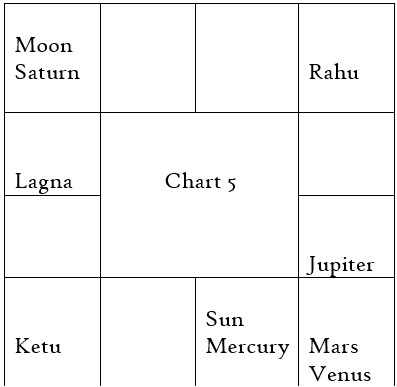Related Articles
SA Volunteer: k2kkhanna
‘Taken From Astrological Magazine Of Raman Saheb, Issue vol 71 No 8’
“MARS (Kuja) whose element is fire rules marriage. Where he is badly situated or associated in the horoscope of a male or female, it follows that the sacerdotal fire gets extinguished soon. Such unfavourable situation goes under the name of Kuja Dosha” (P. 97 of Electional Astrology by Dr. B.V. Raman, 1st edition). It has to be noted that in determining marriage adaptability between two parties, there are several elements of much more importance than Kuja dosha (Martian blemish): the evil influence accruing from the bad position of Mars is only one of them. However, Kuja Dosha is to most people a highly dreaded evil. Is it really so dreadful? Let us examine in detail.
Of course, all malefics play such detrimental role to some extent or the other when they are badly placed in the horoscope. Varahamihira says that a malefic in the 8th from the ascendant or the Moon, whichever is stronger, causes widowhood in the Dasa period of the planet in whose Navamsa Rasi the lord of the 8th house is placed. Of course, a benefic in the 2nd will avert widowhood.
Since Mars is called Angaraka (the destroyer), the evil arising out of the bad position of Mars in the horoscope, is known as ‘Angaraka Dosha’. Since Mangala is a synonym of Mars, the evil is also known as Mangalika Dosha’. The ascendant represent the body, the Moon the mind and Venus the sex relations.
Therefore in respect of this dosha, the houses have to be reckoned with reference to all the three, viz., ascendant, the Moon and Venus. But the dosha (evil) is considered weak when it exists from the ascendant, a little stronger from the Moon and still more powerful from Venus. Similarly though there is Kuja Dosha when Mars is posited in the 2nd (family), the 4th (happiness in family life), the 7th (marriage), the 8th (longevity) and 12th (pleasures of bed) from the ascendant, the Moon and Venus in any horoscope, the dosha is considered weak when it exists from the 2nd, the 4th and the 12th, but severe in the 7th and the 8th. If, in any horoscope, the lord of the 7th from the ascendant, the Moon or Venus is aspected by Mars, then also there is Kuja Dosha in that horoscope. In case Kuja Dosha occurs in the horoscope of a female, the death of her husband will occur; and in the horoscope of both the bride and the bridegroom, the dosha gets cancelled. This is based on the Nyaya Sastra. If in the girl’s horoscope widowhood is indicated, the selection of bridegroom should be such as having an equal affliction, showing death of the wife(see para 6). For example if the 8th house in the horoscope of the male should have Mars in it, then the bad effect gets neutralized according to the Nyaya dictum Swamadhyasthitha mamsapinda nyaya! Several horoscopes which are compatible in other respects are being turned down by many astrologers for the single reason of the so-called Kuja Dosha, ignoring the fact that there are a good number of combinations which assure marital felicity. This is well brought out in Electional Astrology.
Nature of Mars: Mars is fiery planet, his effects are quick and sudden. He is a “papa” because of his cruel nature and thamasic qualities. Mars represent physical strength, the desire for action, criminal deeds and the expression of warlike tendencies. He is generous and is of a youthful personality; and stands for vitamins D and K, whose deficiency will cause unhealthy conditions, fragile blood vessels, bleeding, etc. At birth, if Mars has no strength, the person concerned will not have vim, vigour and vitality. When posited in his own or exaltation or friendly house in a horoscope, Mars is an asset to the native. He may give an attractive personality, sanguine temperament, courage, executive ability, official capacity and power. On the other hand, when he is disposed or owns unfavourable houses or associated with or is aspected by other malefics, Mars get afflicted and indicates hatred, loss of brothers and sisters, dispute pertaining to land, injuries and accidents, haemorrhage, menstrual trouble, abortion, surgical operations, etc. Being a natural malefic, Mars gives good results like the Sun when owning quadrants especially the 10th; or occupying the 3rd, the 6th and the 11th. Mars is the maker of blood in the body. A bad Mars is the maker of bad blood which leads one astray and causes embittering relationship with other people (vide Chart 5). When highly afflicted, Mars makes one violent, revengeful and vindictive; and commit acts which may lead him to the scaffold. In matrimonial matters, it is well-known fact that Mars causes greater evil than any other malefic. He is a “jealous lover of the Moon”, while he has a great respect for his bosom friends, Jupiter and the Sun. But his association with Jupiter only is good for marital purposes. Mars associated with Venus in a horoscope denotes moral lapses and causes Kuja Dosha. Generally the influence of Mars on Venus indicates harshness in affection, quarrelsome nature and unwholesome marital relations (vide Chart 5). But Mars-Venus harmonious aspects give warm feelings and affection. See Gandiji’s chart. A peculiar quality of mars is that he can aspect the 4th, the 7th and the 8th houses from where he is posited and easily play havoc with them; and make one feel irredeemably miserable unless mitigated by the aspect of or association of strong Jupiter: Mars shuns his fiery nature and attains his sattwik qualities when is posited in constellations like Anuradha and Sravana; but he is cruel in Dhanistha, Moola, etc.
Mars in the ascendant: The ascendant or the 1st house represents childhood, environment, personality, the physical body and character. When in the ascendant, Mars indicates a hot constitution, angry temperament, scars in the body, early danger to father, etc. But a good mars in the ascendant makes the native respected, active and powerful. When Mars is posited in the 1st, he vitiates the brain and not only the ascendant, but also 4th, the 7th and the 8th from the ascendant; and prejudicially affects the person, his home life, marital relations and longevity (of the husband in the case of a female and of the wife in case of a male), provided he is not a benefic. Ordinarily, when Mars is in the ascendant in the horoscope, the domestic life of the person concerned will be unhappy and the horoscope is said to have Kuja Dosha. This is so even if Mars is with the weak Moon or Venus (see Chart 5). But Kuja Dosha gets counteracted by the conjunction of Mars and Jupiter; or Mars and the powerful Moon or when Saturn is in the ascendant, the 5th, the 7th or the 8th or the 10th from the ascendant. Similarly when the ascendant is Aquarius Mars produces no dosha. In Chart 1, Mars is in ascendant aspected by Jupiter and also by Venus, lord of the ascendant. Mars is here the lord of a quadrant and being aspected by three benefics Mercury, Jupiter and Venus, has become a strong benefic. Note that in the Navamsa too, Mars is strong since he is in Aries aspected by Jupiter. Hence the native has no Kuja Dosha9. This is evidenced from the fact that though the native is more than 76, her husband is still alive, hale and healthy even at the age of 83.
Mars in the 2nd house: The 2nd house in a horoscope represents family, face, right eye, speech, wealth; and the manner and source of death. When posited in the 2nd, Mars vitiates not only the 2nd but the 5th (children), the 8th (longevity) and the 9th (fortune) from the ascendant and thus can at a stretch destroy family, cause trouble to children, bring about early death and create misery in life, provided it is not a benefic. When Mars is in the 2nd for a male, it denotes destruction of wife, and for a female, destruction of husband. This is called Kuja Dosha. But it must be noted that Mars in the 2nd is bad, provided such 2nd house is any other than Virgo and Gemini. This means that a person born in Leo and Taurus as ascendants will not have Kuja Dosha, even if Mars is in the 2nd house. Note that Virgo becomes the 2nd for Leo persons and Mars is a benefic for Leo, since he becomes lord of a quadrant and trine. Similarly when ascendant is Taurus, Gemini becomes the 2nd and Mars posited there becomes a benefic because of his ownership of a quadrant from Taurus.
It is also said that if one is born in Pisces (ascendant) and Mars is in the 2nd in Aries, the dosha gets cancelled. Similarly for Libra persons when Mars is in the 2nd in Scorpio, there may not arise Kuja Dosha. In Chart 2 there is Kuja Dosha since Mars is in the 2nd from the ascendant. Mars, although posited in Sagittarius in the sign of Jupiter, is not being aspected by Jupiter and is posited in the asterism of Venus, a malefic because of his ownership of the 7th from the ascendant. The affliction of the 7th house from the Moon was too great that the native lost her husband very early in life and became a widow in the Dasa period of Saturn in the Bhukti period of Jupiter. Note that Saturn is debilitated and associated with Rahu; and he aspects the Bhukti lord.
Mars in the 4th house: The 4th house in a horoscope is the embodiment of all material comforts, including happiness in family life. When posited in the 4th, Mars vitiates not only the 4th but the 7th (marriage), the 10th (effective karma which certainly calls for the help of a devoted wife) and the 11th (house of fulfillment desires), provided he is not a benefic. In the horoscope of a male, if Mars is in the 4th not aspected by a benefic, he will have difficulties through his wife and it denotes dwikalatrayoga (two wives). If the horoscope belongs to a female, she may commit adultery, leave her husband or die. Thus when Mars is 4th house, there is Kuja Dosha. But it may be noted that in the 4th house, Mars causes the dosha provided the house falls in any sign other than Aries and Scorpio. Here, the two ascendants involved are Capricorn and Leo. This means that Mars in the 4th for Capricorn (ascendant) and for Leo (ascendant) does not produce Kuja Dosha. In the former case, he becomes the lord of a quadrant and in the latter, the lord of a quadrant and trine alike; and is thus turned into a benefic. In Chart 3 Mars is in the 4th from the Moon and & 7th from the ascendant; yet the native had no Kuja Dosha. Note that Mars is powerful being placed in Aries in a quadrant both from the ascendant and the Moon. Consequently, the native had a happy married life which lasted for about 48 years.
Mars in the 7th house: The 7th house in a horoscope stands for marriage, wife or husband, sexual connections, mutual relationship between husband and wife. Hence this house must be free from affliction for a happy marital life. When posited in the 7th Mars vitiates not only the 7th but the ascendant, the 2nd and the 10th also by his aspect, provided he is not a benefic. If the horoscope is of a male, Mars in the 7th, unaspected by benefics, denotes more than one wife, frequent quarrels and constant separation from wife. If the horoscope is of a female, Mars in the 7th in an evil house or aspected by malefics, denotes early widowhood. Hence it is said that there is kuja dosha when Mars is in the 7th house. When the 7th is other than Capricon and Cancer, the dosha is given rise to. Here the two ascendants involved are Cancer and Capricorn respectively. For Cancer ascendant, Mars is a yogakaraka (benefic), being lord of a trine and quadrant; and hence his situation in the 7th can only do good. Similarly for Capricorn ascendant, Mars is powerful being lord of a quadrant; and the evil effects are greatly diminished vide the saying that when the 7th house from the ascendant or the Moon happens to be Aries, Cancer, Scorpio or Capricorn, there will not be any Kuja Dosha. See chart 3 and footnote 4 under para 5 above. Here, this is a special rule. Ordinarily, Mars in the 7th (from the ascendant) in Aries, if aspected by Saturn, destroys Kalatra. But in Chart 3, Saturn is a yogakaraka. In Chart 4 , Mars is in the 7th from the Moon; yet the native had no Kuja Dosha whatsoever.
Her husband lived long and their married life extended for over 40 years. Note that Mars is in Aries in the 7th from the Moon in his own house and is aspected by powerful Jupiter. The general rule is that a male having Mars in the 7th in his horoscope must be matched with a female having Mars in the 8th house. See para 1 above. If Mars together with afflicted Saturn occupies the 7th in the chart of a female, she is likely to lose her husband in the 6th or 7th month after marriage. But if Mars and Saturn are in the 7th in Cancer in the chart of a male, his wife will be of good disposition, fortunate and chaste. For a male born in Taurus (ascendant) with Venus in the 4th, Mars and Moon in the 7th and Saturn in the 10th, the best horoscopic combination for the partner will be one in which Mars aspects or occupies the 7th, the 2nd or the 4th Bhava. The idea is to compensate for the aspect of Mars on the ascendant in the horoscope. When Mars and Venus are in the 7th the boy or girl concerned will be highly sexed and extremely passionate; and such a person should be mated to one who has similar instincts and not to one having Mercury or Jupiter in the 7th.

Mars in the 8th house: The 8th house in a horoscope denotes longevity, miseries, danger, death and death-like experiences. In the horoscopes of a female, it indicates mangalya (nuptial chord), denoting longevity of the husband. When posited in the 8th Mars vitiates not only the 8th but the 11th, the 2nd and the 3rd also, provided he is not a benefic. If in the horoscope of a female, Mars is in the 8th, it may produce excessive desire; and may make her go astray, unless it is curbed and controlled by Jupiter, etc. If Mars is in the 8th house in the chart of a male, it is likely to cause his own death, while Mars in the 8th in the chart of a female will cause her husband’s death. Thus there is Kuja Dosha in both cases. Mars gives bad effects in the 8th provided that the 8th house is any other than Sagittarius and Pisces. Here the ascendants involved are Taurus and Leo respectively. For Taurus, Mars is a benefic since he is the lord of a quadrant and for Leo he is a yogakaraka, being the lord a quadrant and trine. See para 5 above. Ordinarily, Mars-Venus combination is quite unwelcome (vide paras 2 and 3 above). In Chart 5 Mars is in the 8th from the ascendant in Virgo along with a debilitated Venus aspected by Saturn. Although Mars is in Virgo he has become a malefic. The native courts obstacles in all fields and gets little help from friends and relations. The Dasa period of Venus commenced in 1941 and he married in 1944. He had strained relations with his wife from 1945. This happened in the Dasa period of Venus in the Bhukti period of Mars. He was well employed in 1951; but he resigned his job soon because of his quarrelsome nature. Since then, he is leading a lonely life with a hand-to-mouth existence.
Mars in the 12th house: The 12th house in a horoscope indicates misfortunes, crime, imprisonment, confinement in hospitals, etc. When posited in the 12th, Mars vitiates not only the 12th but the 7th and the 3rd Bhavas also by his aspects and can destroy mainly the house of marriage and of help, provided he is not a benefic. Thus there is Kuja Dosha when Mars is in the 12th from the ascendant, the Moon or Venus. In the 12th, the dosha is produced when such 12th house is any other than Libra and Taurus. In the horoscopes of Nehru and Jayaprakash, Mars is in the 12th of Venus and consequently their wives predeceased them.
From the foregoing it may be seen that even though from the outward appearance, there may be Kuja Dosha in a horoscope, the evil prevails only when Mars becomes a malefic altogether. What is stated in Muhurtha or Electional Astrology by Dr. B. V. Ramana must be an eye-opener to all who view Kuja Dosha with grave concern in and out of season.
Learn Astrology: Join Our Upcoming Astrology Classes — Click Here
Learn Astrology: Join Our Recorded Astrology Classes — Click Here
 Saptarishis Astrology Magazine Into Creating Astrologers
Saptarishis Astrology Magazine Into Creating Astrologers






